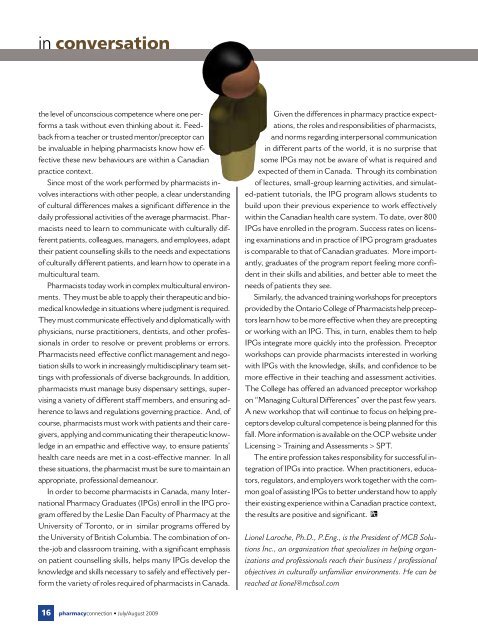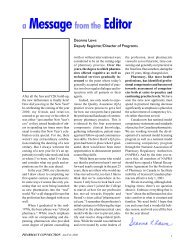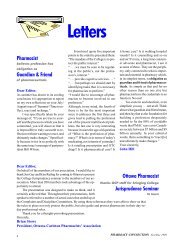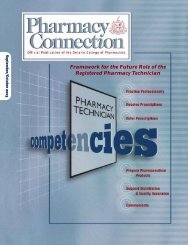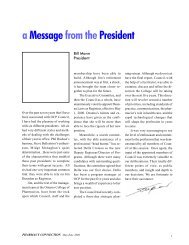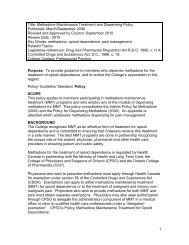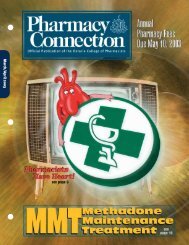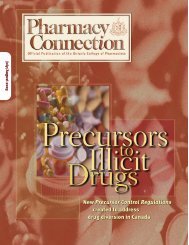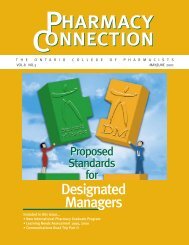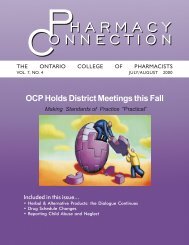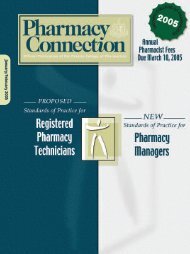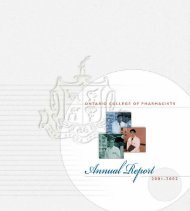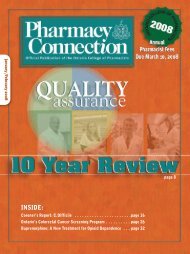Understand the Culture in Which You Practise Hyperthermia: Are ...
Understand the Culture in Which You Practise Hyperthermia: Are ...
Understand the Culture in Which You Practise Hyperthermia: Are ...
Create successful ePaper yourself
Turn your PDF publications into a flip-book with our unique Google optimized e-Paper software.
<strong>in</strong> conversation<br />
<strong>the</strong> level of unconscious competence where one performs<br />
a task without even th<strong>in</strong>k<strong>in</strong>g about it. Feedback<br />
from a teacher or trusted mentor/preceptor can<br />
be <strong>in</strong>valuable <strong>in</strong> help<strong>in</strong>g pharmacists know how effective<br />
<strong>the</strong>se new behaviours are with<strong>in</strong> a Canadian<br />
practice context.<br />
S<strong>in</strong>ce most of <strong>the</strong> work performed by pharmacists <strong>in</strong>volves<br />
<strong>in</strong>teractions with o<strong>the</strong>r people, a clear understand<strong>in</strong>g<br />
of cultural differences makes a significant difference <strong>in</strong> <strong>the</strong><br />
daily professional activities of <strong>the</strong> average pharmacist. Pharmacists<br />
need to learn to communicate with culturally different<br />
patients, colleagues, managers, and employees, adapt<br />
<strong>the</strong>ir patient counsell<strong>in</strong>g skills to <strong>the</strong> needs and expectations<br />
of culturally different patients, and learn how to operate <strong>in</strong> a<br />
multicultural team.<br />
Pharmacists today work <strong>in</strong> complex multicultural environments.<br />
They must be able to apply <strong>the</strong>ir <strong>the</strong>rapeutic and biomedical<br />
knowledge <strong>in</strong> situations where judgment is required.<br />
They must communicate effectively and diplomatically with<br />
physicians, nurse practitioners, dentists, and o<strong>the</strong>r professionals<br />
<strong>in</strong> order to resolve or prevent problems or errors.<br />
Pharmacists need effective conflict management and negotiation<br />
skills to work <strong>in</strong> <strong>in</strong>creas<strong>in</strong>gly multidiscipl<strong>in</strong>ary team sett<strong>in</strong>gs<br />
with professionals of diverse backgrounds. In addition,<br />
pharmacists must manage busy dispensary sett<strong>in</strong>gs, supervis<strong>in</strong>g<br />
a variety of different staff members, and ensur<strong>in</strong>g adherence<br />
to laws and regulations govern<strong>in</strong>g practice. And, of<br />
course, pharmacists must work with patients and <strong>the</strong>ir caregivers,<br />
apply<strong>in</strong>g and communicat<strong>in</strong>g <strong>the</strong>ir <strong>the</strong>rapeutic knowledge<br />
<strong>in</strong> an empathic and effective way, to ensure patients’<br />
health care needs are met <strong>in</strong> a cost-effective manner. In all<br />
<strong>the</strong>se situations, <strong>the</strong> pharmacist must be sure to ma<strong>in</strong>ta<strong>in</strong> an<br />
appropriate, professional demeanour.<br />
In order to become pharmacists <strong>in</strong> Canada, many International<br />
Pharmacy Graduates (IPGs) enroll <strong>in</strong> <strong>the</strong> IPG program<br />
offered by <strong>the</strong> Leslie Dan Faculty of Pharmacy at <strong>the</strong><br />
University of Toronto, or <strong>in</strong> similar programs offered by<br />
<strong>the</strong> University of British Columbia. The comb<strong>in</strong>ation of on<strong>the</strong>-job<br />
and classroom tra<strong>in</strong><strong>in</strong>g, with a significant emphasis<br />
on patient counsell<strong>in</strong>g skills, helps many IPGs develop <strong>the</strong><br />
knowledge and skills necessary to safely and effectively perform<br />
<strong>the</strong> variety of roles required of pharmacists <strong>in</strong> Canada.<br />
Given <strong>the</strong> differences <strong>in</strong> pharmacy practice expectations,<br />
<strong>the</strong> roles and responsibilities of pharmacists,<br />
and norms regard<strong>in</strong>g <strong>in</strong>terpersonal communication<br />
<strong>in</strong> different parts of <strong>the</strong> world, it is no surprise that<br />
some IPGs may not be aware of what is required and<br />
expected of <strong>the</strong>m <strong>in</strong> Canada. Through its comb<strong>in</strong>ation<br />
of lectures, small-group learn<strong>in</strong>g activities, and simulated-patient<br />
tutorials, <strong>the</strong> IPG program allows students to<br />
build upon <strong>the</strong>ir previous experience to work effectively<br />
with<strong>in</strong> <strong>the</strong> Canadian health care system. To date, over 800<br />
IPGs have enrolled <strong>in</strong> <strong>the</strong> program. Success rates on licens<strong>in</strong>g<br />
exam<strong>in</strong>ations and <strong>in</strong> practice of IPG program graduates<br />
is comparable to that of Canadian graduates. More importantly,<br />
graduates of <strong>the</strong> program report feel<strong>in</strong>g more confident<br />
<strong>in</strong> <strong>the</strong>ir skills and abilities, and better able to meet <strong>the</strong><br />
needs of patients <strong>the</strong>y see.<br />
Similarly, <strong>the</strong> advanced tra<strong>in</strong><strong>in</strong>g workshops for preceptors<br />
provided by <strong>the</strong> Ontario College of Pharmacists help preceptors<br />
learn how to be more effective when <strong>the</strong>y are precept<strong>in</strong>g<br />
or work<strong>in</strong>g with an IPG. This, <strong>in</strong> turn, enables <strong>the</strong>m to help<br />
IPGs <strong>in</strong>tegrate more quickly <strong>in</strong>to <strong>the</strong> profession. Preceptor<br />
workshops can provide pharmacists <strong>in</strong>terested <strong>in</strong> work<strong>in</strong>g<br />
with IPGs with <strong>the</strong> knowledge, skills, and confidence to be<br />
more effective <strong>in</strong> <strong>the</strong>ir teach<strong>in</strong>g and assessment activities.<br />
The College has offered an advanced preceptor workshop<br />
on “Manag<strong>in</strong>g Cultural Differences” over <strong>the</strong> past few years.<br />
A new workshop that will cont<strong>in</strong>ue to focus on help<strong>in</strong>g preceptors<br />
develop cultural competence is be<strong>in</strong>g planned for this<br />
fall. More <strong>in</strong>formation is available on <strong>the</strong> OCP website under<br />
Licens<strong>in</strong>g > Tra<strong>in</strong><strong>in</strong>g and Assessments > SPT.<br />
The entire profession takes responsibility for successful <strong>in</strong>tegration<br />
of IPGs <strong>in</strong>to practice. When practitioners, educators,<br />
regulators, and employers work toge<strong>the</strong>r with <strong>the</strong> common<br />
goal of assist<strong>in</strong>g IPGs to better understand how to apply<br />
<strong>the</strong>ir exist<strong>in</strong>g experience with<strong>in</strong> a Canadian practice context,<br />
<strong>the</strong> results are positive and significant.<br />
Lionel Laroche, Ph.D., P.Eng., is <strong>the</strong> President of MCB Solutions<br />
Inc., an organization that specializes <strong>in</strong> help<strong>in</strong>g organizations<br />
and professionals reach <strong>the</strong>ir bus<strong>in</strong>ess / professional<br />
objectives <strong>in</strong> culturally unfamiliar environments. He can be<br />
reached at lionel@mcbsol.com<br />
16 pharmacyconnection • July/August 2009


